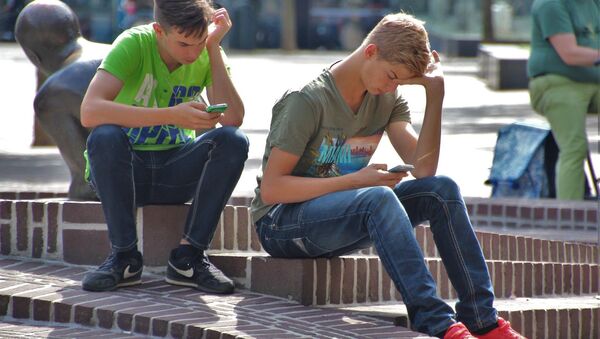Family Counselor Bob Brotchie shares his view on the potential hazards of so many young people having access to smartphones.
Sputnik: Statistics have come out today showing that 50% of ten-year-olds have access to a smartphone and regularly use them. Does this number surprise you?
Brotchie: Yes, but not for the reason you might imagine. I think it's considerably higher than that. I think parents and adults and other caregivers will have phones registered under themselves, and then pass them on to children from the age of ten onwards and younger. So I think it's significantly higher than 50%. Personally.
Sputnik: This number of young people accessing smartphones, do you think that is at all concerning?
Brotchie: There's a dichotomy with it really, because obviously, this is the world they're being born into technology and digital connection. So to deny them that would be a mistake because they're going to be ostracised and marginalised.
But on the other hand, as with everything balance is key. As is parenting. What are parents teaching our kids with our own use of smartphones and technology. Does that then create a gap for children to believe that: 'The Only thing I can connect to is my phone because mum and dad are on their phone'.
There are studies showing that there are behavioural issues arising as a result of a lack of a connection and eye connection.
Sputnik: How much protection is there within the phones and apps themselves for children? Do you think enough is being done to protect them?
Brotchie: I think it's still very much work in progress, I don't think is nearly enough yet. I think with the arrival of AI, that may will be a positive if the technology can be bought around to interpret what data is being looked at, by whom. It sounds like snooping and 'Big Brother' but actually it's going to be necessary because kids can't regulate themselves. And parents are not necessarily going to be with them all the time either. So I think this work in progress, I think there's good things being done, but I think there's so much more still to be done.
Sputnik: Do you think parents of this generation are tech savvy enough? I know that myself and a lot of my peers grew up in a time where the internet was new, as we were discovering it alongside our parents. Do you think parents are more savvy of smartphone technology and the dangerous wherein?
Brotchie: I think they’re more savvy of technology and smartphones. I think it comes down to the conscience of the individual parent as to whether or not they educate themselves as to the risks, and then find a forum to be able to discuss that in a respectful way with their kids. Without it sounding like controlling. Being more educational saying, "well, you're where this can happen".
But similarly, this is another dichotomy, the kids also have to experience some level of risk to be able to manage that risk. Their own emotional wellbeing at the point of discovering risk, or being tripped up, will determine whether they take that risk positively or not. We can't protect them 100% as much as we want to, we don't want our child to fall outside and graze their knee.
But we do also know that's a necessary thing to happen for them to realise it also gets better. So it's a bit of a tricky one, to say the least. It's very, very dynamic.
Sputnik: Overall, do you think this is net positive or a net negative in regards to having this great wealth of information on hand all the time, compared to the risks involved?
Brotchie: I think with balance and moderation it is positive. There's never been so many typists in the world ever, so many people have access to keyboards. The knowledge is fantastic, easy access to knowledge. But it has to be curated and self-curated. We have to educate the kids in a way that shows them that they are valuable even when they're not on their phone.




